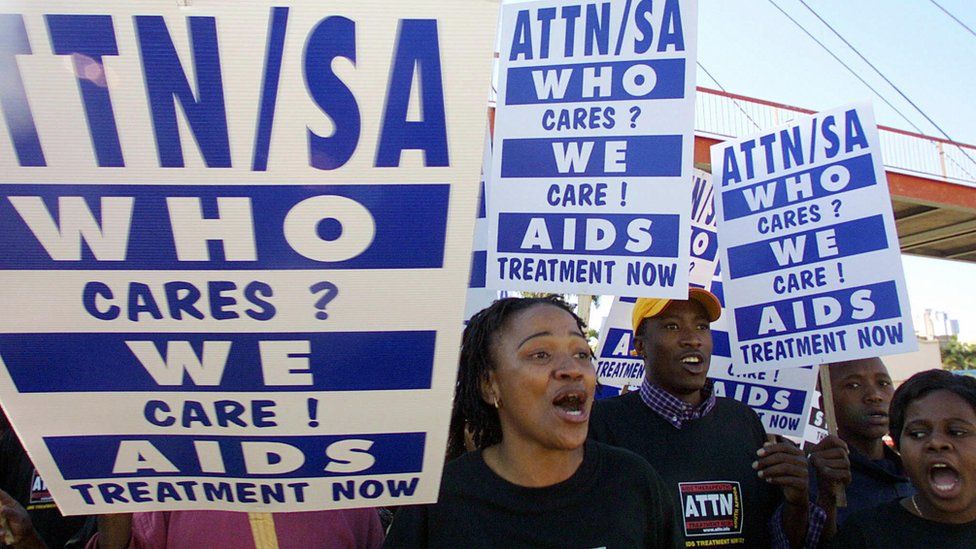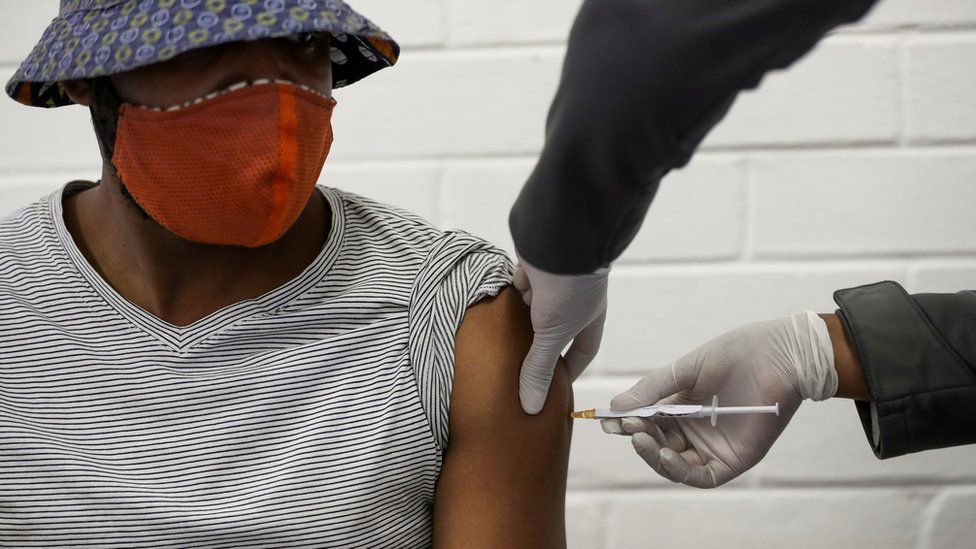
[ad_1]
Africa will have to wait “weeks or even months” before receiving the Covid-19 vaccines approved by the World Health Organization, according to various officials working to obtain doses for the continent.
Nearly 900 million doses have been secured so far through various initiatives, enough to immunize around 30% of the continent’s 1.3 billion people this year.
Hoarding by rich countries, funding gaps, regulations and cold chain requirements have slowed the process of vaccine deployment.
“The world is on the brink of catastrophic moral failure and the price will be paid in lives and livelihoods in the poorest countries,” warned Dr Tedros Ghebreyesus, director of WHO.
Calls for fairness are increasing. Nearly 40 million doses have been administered in at least 49 high-income countries, according to Dr Tedros, compared to just 25 doses given in just one of the low-income countries.
“Not 25 million, not 25,000, just 25,” he said, without saying which country.
So far, none of the major Western vaccines have yet been administered in Africa, nearly two months after the first doses rolled out in Europe.
A coalition of organizations and activists dubbed The People’s Vaccine Alliance found that “wealthy nations representing just 14% of the world’s population have purchased more than half (53%) of all the most promising vaccines.”
This included all Moderna vaccines for 2021 and 96% of Pfizer’s expected production.
Canada tops the rankings, according to data from analysis firm Airfinity, “with enough doses to immunize every Canadian five times.”
Much of this demand must be met before low-income countries can have a turn.
“Don’t look for super profits”
In Africa, the situation revives memories of the 1990s, when antiretroviral therapy (ARV) for HIV / AIDS was developed in the United States.
Even though the continent had a much larger population of people infected with HIV, it took at least six years before life-saving treatment could be made available to Africans.
Twelve million people have died in Africa from AIDS-related complications in a decade, even as mortality in the United States has dropped drastically, according to analyzes from the African Centers for Disease Control and Prevention.

UNAids Executive Director Winnie Byanyima has been at the forefront of those calling for fairness from the makers of Covid-19 vaccines.
“We are not asking them to take losses,” she told the BBC. With ARVs, it was pressure from people living with HIV and right to life advocates that led governments to allow the production of generic treatments that were much more affordable.
“The price [of antiretroviral treatment per person] fell $ 10,000 per year [per person] at only $ 100 per year. “
She wants the same approach for the Covid-19 vaccine, urging the pharmaceutical industry “not to be pushed by the desire for super profits”.
They can still make a profit even if they share their formulas, she added.
“Skip queue”
The WHO chief also calls for fairness: “Even though they speak the language of equitable access, some countries and companies continue to prioritize bilateral agreements, bypassing Covax, driving up prices and attempting to go to the front of the queue, ”he said. said.

The Covax facility is an initiative of the WHO and the Vaccine Alliance to equitably distribute Covid-19 vaccines around the world.
“Most of the major vaccine supplies were preordered by rich countries even before safety and efficacy data became available,” said Dr Richard Mihigo, head of immunization and vaccine development at the office. of the WHO for Africa.
Asked why Covax has not done the same, he said securing funding was the first task the initiative embarked on. So far, $ 6 billion has been raised of a target of $ 8 billion for 92 middle and low-income countries, according to the Vaccine Alliance’s Thabani Maphosa, Gavi.
So far, the facility has obtained two billion doses for this group of countries, which includes all of Africa. Some 600 million are for the continent.
The African Union has arranged for member states to seek $ 7 billion in funding from lenders, which would cover up to 270 million vaccines, according to its current president, South African President Cyril Ramaphosa.
“Operation mammoth”
But it is not just the purchase of vaccines that requires funding. Countries have also stepped up their cold chains by preparing for their arrival. These are especially important for the Pfizer vaccine, which should be stored at -70 ° C.
The United Nations children’s agency, Unicef, which typically handles the distribution of childhood vaccines, will take care of the logistics of delivering Covid-19 vaccines as part of the Covax facility.
The agency is preparing to transport at least twice its usual capacity – what it calls “a gigantic and historic logistics.
But before that can be done, countries must have an infrastructure ready to receive and administer the doses.
Benjamin Schreiber, who coordinates the Covax installation for Unicef, says he is “worried that we do not have enough resources for deployment and preparation”.
“What we’re seeing when deploying to some high-income countries is that it’s complicated, it has to be resourced and properly planned, and there haven’t been enough global resources for them. low-income country, ”he told the BBC.
Despite the shortcomings, it paints a more optimistic picture of the continent’s ability to introduce new vaccines.
“Africa has a lot more experience than many other regions – we have done so many vaccine introductions in the last 10 years and there is good expertise to organize targeted vaccination campaigns.”
He adds that some countries that have faced Ebola also have expertise and experience and ultra-cold chain infrastructure.
Even before the pandemic hits, the organization says it is supporting cold chain infrastructure in low-income countries, including the installation of 70,000 refrigerators, half of which are solar-powered.
Country-by-country status was not immediately available. Mr. Maphosa de Gavi said countries are currently submitting documents to the facility to inform them of their willingness to deploy vaccines.
One vaccine approved by WHO
But even if they were ready, regulatory issues still stand in the way. As part of the Covax facility, only vaccines approved by WHO can be purchased.
So far, only Pfizer has been listed for emergency use by the WHO. The approval process for Moderna and Astrazeneza vaccines is ongoing.
“Vaccines recommended for emergency use absolutely must meet minimum standards for safety and efficacy,” said Dr Mihigo.
More developed countries such as the United States and EU states have regulatory agencies that “complement” the work of the WHO and therefore could deploy vaccines without the agency’s approval.
However, in the developing world, many countries rely on the WHO for due diligence, adds Dr Mihigo.
This quality assurance has a direct impact on people’s willingness to get vaccinated.
A study conducted by the Africa CDC and the London School of Hygiene and Tropical Medicine in the last quarter of 2020 found that a majority of Africans – four in five – would be willing to take a Covid-19 vaccine “if that was deemed safe and effective ”.
Several countries, however, have deployed vaccines that have not yet been approved by WHO. “We advise countries to rely not only on the prequalification of the organization, but also on any other relevant ‘strict regulatory authority’,” said Dr Mihigo.
The Seychelles, Morocco and Egypt administer the Chinese-made Sinopharm vaccine and Guinea, the Russian vaccine Sputnik V.
Africa CDC director John Nkengasong said there were no negotiations underway to purchase the two vaccines, but the regional body was “in talks” with producing countries. More and more African countries are interested in these two candidate vaccines as the wait for the West’s most important continues.
Help “ unlearned ” lessons
The BBC could not establish a precise date from the official involved as to when the Covax vaccines could be delivered to the mainland. The most optimistic estimate was for February but ran through the end of March for initial shipments from the Covax facility.
“We want to distribute the first doses as quickly as possible,” said Unicef’s Schreiber.
The 270 million doses obtained directly by the African Union are expected to be delivered from April.
No doses of WHO-approved vaccines are currently available for distribution on the continent.
“This lesson [from the HIV antiretroviral treatment] has still not been learned, ”said Ms. Byanyima of UNAids.
Source link